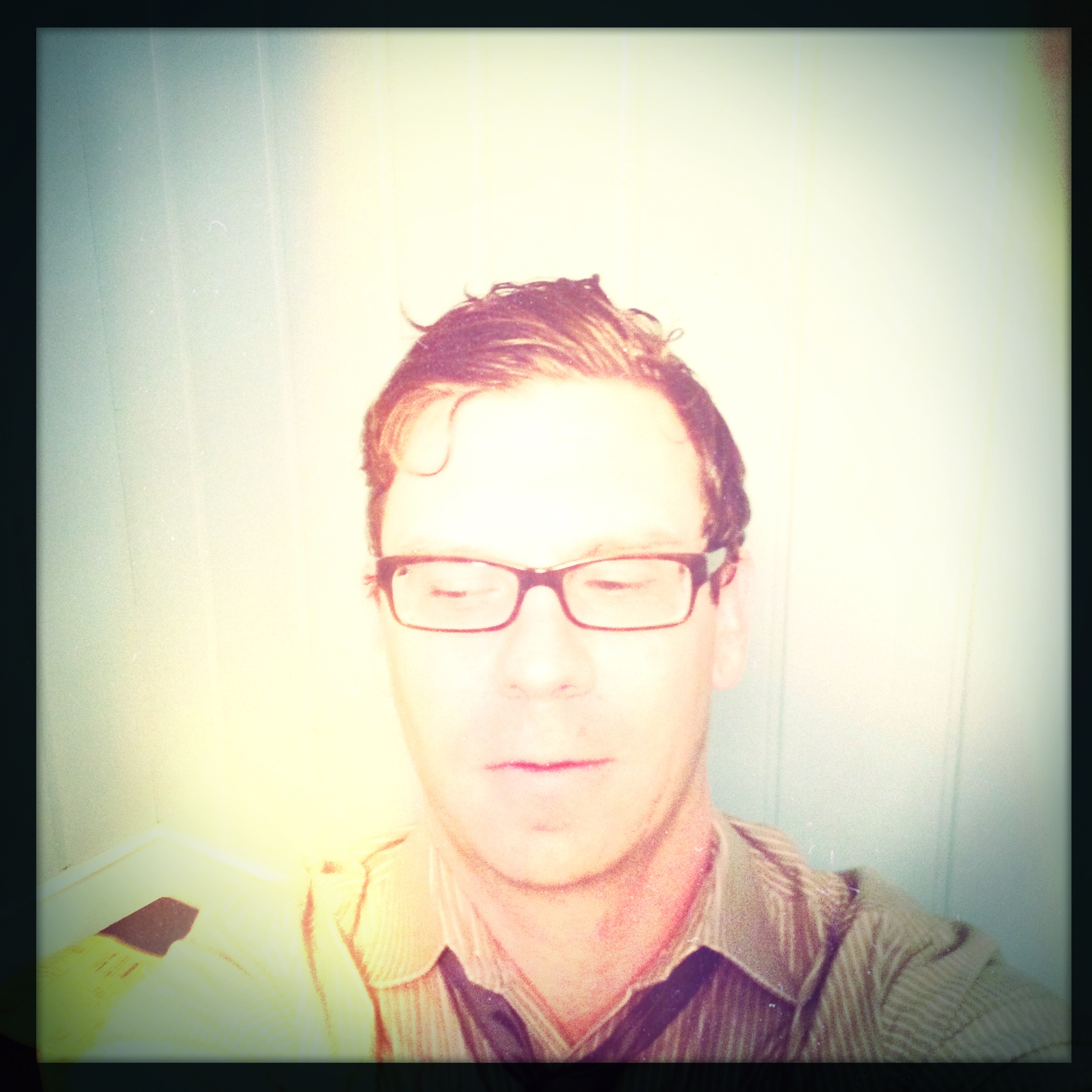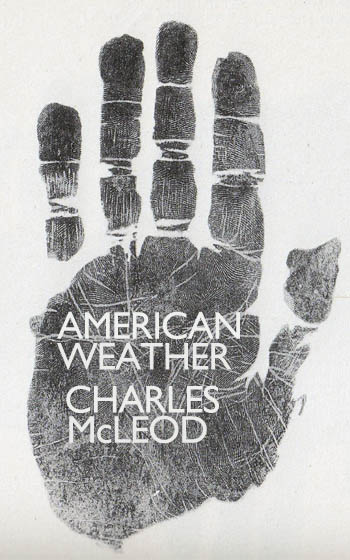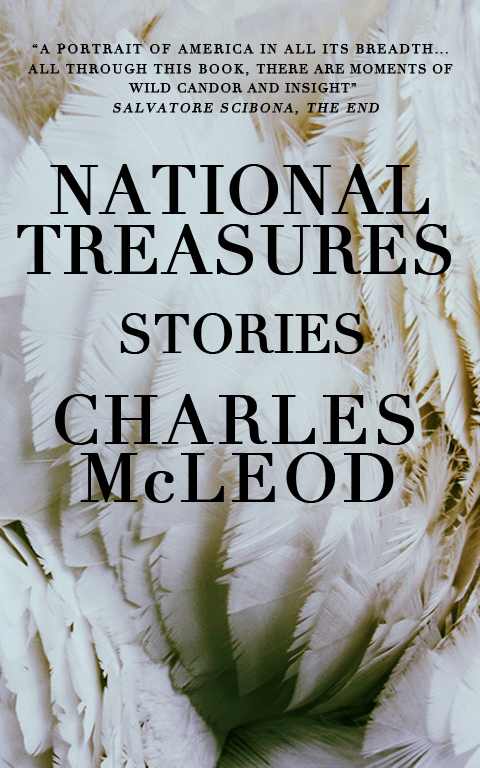Interview: Charles McLeod
 Charles McLeod is the author of a novel, American Weather, and a collection of stories, National Treasures. His fiction has received a Pushcart Prize and won The Iowa Review’s Fiction contest, and appeared in publications including Alaska Quarterly Review, Conjunctions, Third Coast, Michigan Quarterly Review, New Writing from the Midwest, and the Norton anthology Fakes. He’s also served as Midwest Editor for online lit mag Joyland and has stories forthcoming in Phantom Drift and MAKE.
Charles McLeod is the author of a novel, American Weather, and a collection of stories, National Treasures. His fiction has received a Pushcart Prize and won The Iowa Review’s Fiction contest, and appeared in publications including Alaska Quarterly Review, Conjunctions, Third Coast, Michigan Quarterly Review, New Writing from the Midwest, and the Norton anthology Fakes. He’s also served as Midwest Editor for online lit mag Joyland and has stories forthcoming in Phantom Drift and MAKE.
Midwestern Gothic: First things first, tell us about your Midwestern roots?
Charles McLeod: After starting college on the West Coast, where I grew up, I finished my undergrad at the University of Iowa, and stayed in Iowa City for an additional year to play music/be a ne’er-do-well. A decade later, I moved back to the Midwest, to a take a teaching job. I stayed there two years, before coming west again. I’ve been all over Iowa and South Dakota and Illinois, and much of Nebraska, but am less familiar with the Midwest’s east end—Michigan and Ohio and Indiana.
MG: How do you feel the Midwest has influenced your writing?
CM: In ways that may be more subconscious than conscious. The Midwest is where I wrote my very first stories, and just as I was a newcomer to the region, I find myself often writing about characters in some way juxtaposed to the settings that they find themselves in. Past this, I found myself drawn to writers with one foot in the Midwest and another on the West Coast. Raymond Carver and Denis Johnson are two writers that come to mind. I can remember reading Jesus’ Son for the first time and, like other writers I know, being profoundly changed, and feeling like I had understood literature all over again, and for the first time. In both of those writers, there is an amalgam of Midwest straightforwardness and ethic and West Coast progressivism and experimentalism (minimalism was, at one point, experimental) that really spoke to me. In these ways, the region provided me with my literary foundations.
MG: What do you think defines this place?
CM: Community. Be it Chicago or Kansas City or Peoria or Aberdeen, it’s community before anything else—a sense of the group being as much if not more important than the individual. It’s easy to argue that this belief has broken down or been co-opted by corporate entities in recent decades, but in my experience, the good side of community—of selflessness, of civic belief—still pervades in the Midwest in a way not dissimilar to the American South, while also being very much its own. As an outsider to the Midwest, I was able, at moments, to interpret this sense of community—especially in smaller cities and towns—as xenophobia brought about via cultural isolation, but in more cases than not, this was poor translation on my part, and any critical perception of me as outsider arrived as an unasked and worthy question: are you to here to offer at least as much as you plan to consume? I would argue that historically this is very different than the West, where mining and oil concerns and Hollywood made for more of a grab-what-you-can mentality.
MG: What do you think will define the region going forward? Are there any cultural shifts or movements happening that you see?
CM: I’m interested in places like Dubuque, Iowa—cities that were once symbols of the Midwest’s decay but have been able to revitalize their downtowns and use space functionally and progressively. I’m very interested to see what will happen with Detroit, and how Michigan and America will remake that city with just under half of its adult population being functionally illiterate. I’m interested to see whether more and more farmers will stand up to the likes of Monsanto, and follow other countries in demanding the abolishment of GM crops in order to sustain seed biodiversity—whether the pockets of American farmers doing that now can grow in size and voice. I think that cities like St. Louis and Minneapolis are now as big of cultural innovators and drivers as New York or LA. If Big Ag can be cut down to size, and green industry can fill up the still largely vacant Rust Belt, then the Midwest is poised for a region-wide renaissance.
MG: Your latest project was editing the California Prose Directory. What are your feelings on regional writing, Midwest versus West Coast? Do you notice a difference in how people write, or any possible trends in the different styles?
CM: I might make the case that California writing seems more willing to confront and challenge the notion of a regional identity than Midwestern writing; that is, I think that Midwestern writing might be able to agree on a common point of departure from an established norm, and I hesitate to say that California writing could. There’s no judgment in this—one is not better than the other—but I do think that California finds a larger portion of its literary identity in going against any notion of an established literary identity and in maintaining that absolutes do not and shall not exist.
 MG: American Weather was initially published in England. What are your feelings on how English readers experience the novel versus American ones?
MG: American Weather was initially published in England. What are your feelings on how English readers experience the novel versus American ones?
CM: I think that the book had an easier time finding a home in Europe as it’s very highly critical of American culture, and, in general, it’s easier to point the finger at others than one’s self. I remain amazed that there is not a larger outcry—indeed, not outright riots—in regard to PRISM, the IRS scandal, drones, spying on AP reporters, corporate corruption of our food supply and government, poor quality of public education, poor quality of civic infrastructure, and on and on. More than a decade after 9/11, we as a culture remain petrified and xenophobic, and the more craven portions of our government and our private sector have fed off this fear, so much so that if we were once the hosts, and they the parasites, those roles have reversed themselves, and we suck whatever scant amount of toxic blood they offer. Active dissent has perhaps never been weaker in America than it is at present; instead, we scream into Facebook and Twitter, amazed no change occurs, then turn on The Colbert Report and watch our decay in real time, and, amazingly, laugh at it. I think that in general, Juvenalian satire asks more its audience than Horatian satire does, and American Weather is certainly the former. But this didn’t really answer this question so well, did it? Sorry.
MG: Of your various publications, which proved the most difficult to work on?
CM: The novel. I was working under deadline, and it was my first go at the long form, and the manuscript had no time to sit before my editor and I began combing through it. Added to these things was doing a second kind of editing with Random House’s legal department, and determining what names/acts could and could not be used in the book, if we were to avoid the distinct possibility of multiple libel suits. Built into that was the notion of self-censoring, and that was ugly to consider. But the folks at RHUK were great about it, and the comprises made do not, in my mind, subvert the book’s very loud opinions.
MG: Which of your publications is your favorite or most meaningful? Why?
 CM: I’m very happy that the story collection found a home both here and overseas. It’s the culmination of years of work, and covers much ground formally and geographically. Editing the California Prose Directory has been so wonderful, and meaningful in a different and more profound way than having original work published. To be able to play curator for so many amazing writers and pieces of writing has been a real gift, and it’s been great to be able to contribute something to California’s storied literary legacy.
CM: I’m very happy that the story collection found a home both here and overseas. It’s the culmination of years of work, and covers much ground formally and geographically. Editing the California Prose Directory has been so wonderful, and meaningful in a different and more profound way than having original work published. To be able to play curator for so many amazing writers and pieces of writing has been a real gift, and it’s been great to be able to contribute something to California’s storied literary legacy.
MG: What’s next for you?
CM: I just finished a novel-in-flash, parts of which are set in the Midwest, and I’m currently working on a second collection of stories, a third novel, and a nonfiction book. By the time anyone’s reading this, I will have moved from Colorado to Texas. It will be my twelfth move in thirteen years. I realized the other week that the last time I lived at the same address for three or more years was 1988-1990—a long time ago.







June 27th, 2013 at 3:55 pm
Thank you “Gothic,” I wasn’t aware of Mr. McLeod writings and will now become acquainted. We seem to share the same views. As a mid-Western expatriate, Cedar Rapids, Iowa, who has lived in San Francisco for the past 40 years, I can relate to the progressive West and the community of the mid-West. Interesting!
June 27th, 2013 at 11:02 pm
Always a pleasure to introduce folks to new writers – and Charles is one of our faves!
July 3rd, 2013 at 7:36 pm
[…] Take a look at Charles McLeod and then his work. […]